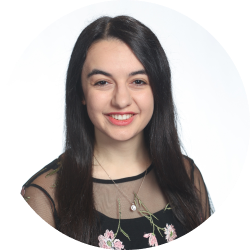Warsaw Quantum Computing Group: Virtual Talk
LOCATION
Virtual
WHEN
Thurs, 16 Jan 2025: 5pm GMT

Maria Violaris
DEVELOPER ADVOCATE
Maria has a hybrid role at OQC of quantum error correction research towards building a fault-tolerant quantum computer, and technical science communication. She has a PhD in theoretical quantum information from the University of Oxford, alongside which she interned with IBM Quantum making the “Quantum Paradoxes” YouTube series. She has spearheaded multiple new initiatives in the quantum community, including the “Quantum on the Clock” Schools Video Competition; Oxford Quantum Information Society; and quantum computing workshops. She has also written for Physics World magazine; published quantum education research; and hosts a Quantum Foundations Podcast on her YouTube channel, amongst other quantum content.
EVENT DETAILS
The Warsaw Quantum Computing Group (WQCG) organises meetups for quantum computing enthusiasts in Warsaw, with the goal of facilitating the education and collaboration of people interested in quantum computing.
Our Developer Advocate, Maria Violaris, will be holding a virtual talk for the WQCG on January 16th on the topic of quantum error correction.
SESSION DETAILS
Thursday 16th Jan 2025, 5pm GMT
Developments in superconducting erasure qubits for hardware-efficient quantum error correction
Abstract: Quantum computers are inherently noisy, and one of the key challenges for achieving large-scale, fault-tolerant quantum computing is to implement quantum error correction. In recent years, significant progress has been made in exploring and developing quantum error correction theory, in addition to experimental demonstrators of important milestones using various hardware platforms. An interesting direction has gained popularity of designing hardware that has a specific noise profile, leading to a significantly higher threshold for noise with certain quantum error correcting codes. In this talk, I introduce erasure qubits, which enable a particular type of hardware-efficient quantum error correction that uses a “dual-rail encoding” concatenated with another code. I will discuss implementations of erasure qubits using superconducting hardware, giving an overview of recent developments in theory and simulation, and hardware demonstrators. I will also cover the differences between implementations; near-term applications to the NISQ era and quantum error detection; and challenges and open questions for this approach.
Missed the live session? Don’t worry! Find the full recording of Maria’s talk along with the Q&A session here.